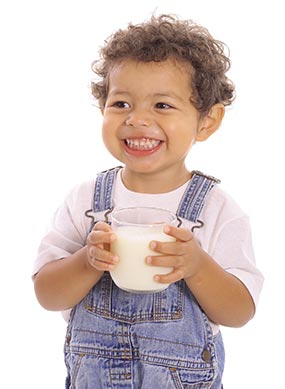At a glance
Pasteurized, whole cow’s milk and fortified soy beverages are good sources of vitamin D and calcium for children 12 months and older. Learn more about serving cow's milk and milk alternatives to your child.

Source of vitamin D and calcium
Your growing child needs vitamins and minerals such as vitamin D and calcium to build strong bones. Pasteurized, whole cow’s milk and fortified soy beverages are good sources of vitamin D and calcium for children 12 months and older. Most cow's milk sold in the U.S. is fortified with vitamin D. Look for soy beverages fortified with vitamin D and calcium.
When to introduce cow's milk to your child
You can introduce your child to cow's milk at 12 months old (but not before). Before your child is 12 months old, cow's milk:
- May put them at risk for intestinal bleeding.
- Has too many proteins and minerals for your baby's kidneys.
- Does not have the right amount of nutrients that your baby needs.
How much and how often
Cow's milk or fortified soy beverages can be included in a child's balanced and diverse diet from 12 months onward but is not a substitute for food.
The Dietary Guidelines for Americans recommend children aged 12 through 23 months get 1⅔ to 2 cups equivalents of dairy daily, including:
- Cow's milk (pasteurized, whole milk fortified with vitamin D, unflavored, and unsweetened).
- Yogurt.
- Cheese.
- Fortified soy beverages (fortified with calcium and vitamin D, unflavored, and unsweetened).
- Soy-based yogurt.
If your child drinks too much cow's milk, they may not be hungry for other foods with important nutrients. Some experts say getting too much cow's milk can make it harder for children's bodies to absorb needed iron from foods.
Follow your child's cues to decide when they are hungry or full. Talk with your child's doctor or nurse for questions about adding cow's milk or fortified soy beverages to their diet.
Whole cow's milk or lower fat cow's milk
Children can drink unflavored, unsweetened whole cow’s milk. Whole cow’s milk is the same as lower-fat cow’s milk except higher in fat. Young children need fat in their diet for healthy growth and development. If your child has excessive weight gain or a family history of obesity, high cholesterol, or cardiovascular disease, consult their doctor. Discuss with them the type of cow’s milk to give.
Raw or unpasteurized milk
Raw milk and raw milk products from cows, goats, and sheep can carry harmful bacteria and other germs. These harmful bacteria and germs can make your child very sick and can be life-threatening. Raw milk can also be called unpasteurized milk. Do not give your child raw or unpasteurized milk.
Plant-based milk alternatives
Plant-based milk alternatives can include beverages made from plants, such as soy, oat, rice, coconut, cashew, and almond.
If you choose a plant-based milk alternative, remember:
Milk alternatives should not be given before your child is 12 months.
Fortified soy beverages are the only milk alternative that help meet a child's recommended dairy needs.
Choose one that is unflavored and unsweetened. Your child does not need added sugars.
Choose one fortified with vitamin D and calcium. Check labels because nutrient content can vary between brands.
Talk with your child's doctor or nurse about the milk alternative you are using. The vitamins and minerals in milk alternatives are different than in cow's milk.